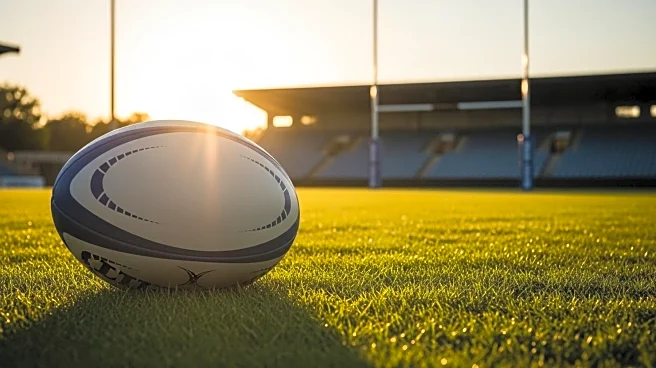What's Happening?
Rugby Australia has reaffirmed its dedication to the women's rugby program following reports of potential budget cuts. The organization plans to maintain a minimum of 10 Test matches annually from 2026 leading up to the 2029 Women's Rugby World Cup, which will be hosted in Australia. This commitment comes after the resignation of Women's High Performance manager Jaime Fernandez, who left due to the budget cut concerns. Despite these challenges, Rugby Australia has more than doubled its investment in the women's game over the last World Cup cycle. The Wallaroos, Australia's national women's rugby team, have reached the quarterfinals in the last two World Cups, and efforts are underway to enhance their performance through a high-performance program. Interim coaching positions have been filled, with Sam Needs as interim head coach and Gill Bourke as interim assistant coach, while Andy Friend has been appointed as a technical advisor.
Why It's Important?
The commitment from Rugby Australia to the women's rugby program is significant as it ensures continued support and development for the sport, despite financial challenges. This move is crucial for maintaining the momentum and growth of women's rugby in Australia, especially with the upcoming 2029 Women's Rugby World Cup. The decision to lock in annual Test matches and tours reflects a strategic approach to elevate the Wallaroos' performance on the international stage. The increased investment in the women's game highlights Rugby Australia's recognition of the importance of gender equality in sports and the need to provide adequate resources for female athletes. This development could inspire other sports organizations to prioritize women's sports and address funding disparities.
What's Next?
Rugby Australia plans to deliver a fully resourced program starting in 2026, which will include the existing Pacific Four series and the new WXV Global series. The organization has confirmed tours of the USA and Europe, providing the Wallaroos with more opportunities to compete internationally. The interim coaching appointments suggest a period of transition and evaluation, with potential long-term coaching decisions to be made in the future. Stakeholders, including players, coaches, and fans, will likely monitor the implementation of these plans closely, as they could impact the team's preparation and performance in the lead-up to the 2029 World Cup.
Beyond the Headlines
The reaffirmation of Rugby Australia's commitment to women's rugby amid budget concerns raises broader questions about funding equity in sports. The resignation of a key manager due to budget cuts highlights the challenges faced by women's sports programs in securing consistent financial support. This situation underscores the need for sports organizations to balance financial constraints with the imperative to promote gender equality and support female athletes. The long-term impact of these decisions could influence public perception and policy regarding investment in women's sports, potentially leading to increased advocacy for equitable funding across all levels of sport.









